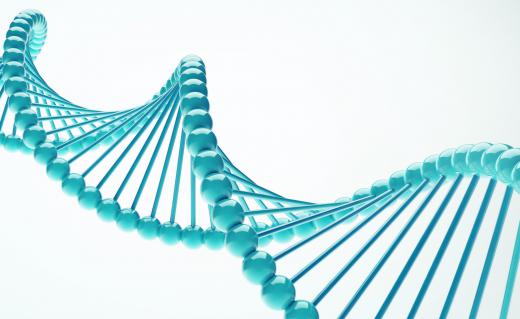What is a Helix?
A helix is a shape formed by a smooth curve. To visualize this shape, one can imagine a ribbon wound around a stick, or the spiral cord between a telephone handset and its base. A spiral staircase is another practical example.
In biology, large molecules do not exist simply as long straight chains; instead, they coil and fold into very complex forms. The form a molecule has plays a crucial role in determining the properties and function of the molecule. A helix is one such three-dimensional shape formed by large molecules, and it has an important role in biology.

Helices can either be right or left-handed, depending on the turn of the curve around the center axis. The orientation can be determined by looking at the form along its length. If the movement away from the observer is clockwise, then the structure is right-handed. If the movement is in the counter-clockwise direction, then it is left-handed. The handedness, or chirality, cannot be changed by looking at it from a different perspective, but is an inherent property of the shape.

In 1951, Linus Pauling and Robert B. Corey of the California Institute of Technology showed that precise coiling of the protein keratin allowed hydrogen bonds to form and stabilize the structure. What they discovered was an alpha helix, which is a right-handed form. They determined that the helical structure helps to maintain the shape of the molecule and gives it much more stability than when it is unwound.

Proteins are made up of chains of amino acids, called polypeptides. Within proteins, each turn of the alpha helix takes up about 3.6 amino acids of the chain. The helical shape is maintained through hydrogen bonds forming between the amino group of one amino acid and the oxygen of the third amino acid beyond it in the chain.
Fibrous proteins, including keratin, show a helical pattern at its most basic. There are also complex proteins that have helical arrangements, including collagen, which is a triple helix. Collagen is made up of three polypeptide chains, each right-handed, all wound around each other.

Deoxyribonucleic acid (DNA) and ribonucleic acid (RNA) are two other examples of molecules that have an alpha helical structure. RNA usually consists of a single strand of nucleotides wound into an alpha helix, while DNA is made up of two strands. It is very rare for DNA to exist in a single chain; instead, two identical chains, oriented in opposite directions, are arranged side by side. The nitrogenous bases between the two link together through hydrogen bonding, forming bridges, like the rungs of a ladder. This makes DNA very stable, which is extremely important to protect the genetic material stored in a molecule.
AS FEATURED ON:
AS FEATURED ON:















Discussion Comments
@Iluviaporos - That kind of crowd sourcing is really wonderful. There's a few research games you can play online now.
I believe one of them might involve classifying sea life, including shellfish which often have a helix in their shell structure. The golden ratio is a helix, and it is supposed to be one of the most common shapes in nature, so it's hardly surprising that shells, staircases and molecules all take advantage of it.
One of the things that makes me hopeful about the world was reading about how some scientists are using crowd sourcing to figure out the shapes of those molecules that coil in on themselves. When you unwind them, they might be in a helix type shape, but it's important in some cases to figure out the coiled up shape so that they can be better manipulated or understood. But the shapes are often so complex that it takes a long time to figure them out with the information available.
The scientists put up the information as though it was a video game and got "players" from around the world to work on the puzzle. They were astounded by how quickly the players would work out the shapes and in one case they figured out a shape that had stumped scientists for years.
Post your comments